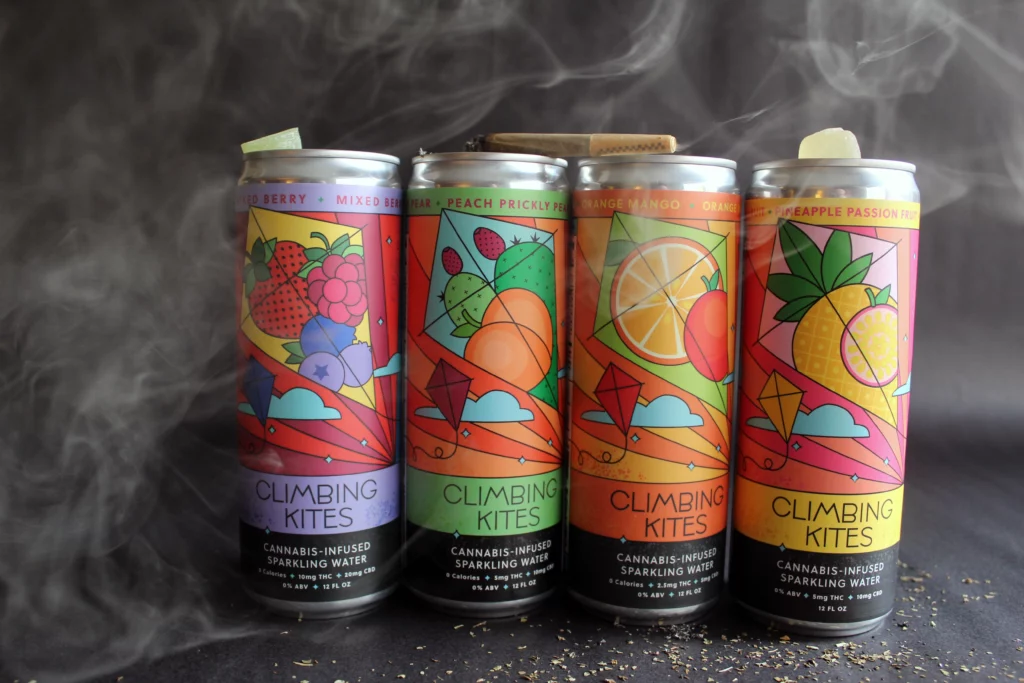How Climbing Kites and NORML battle against misinformation to create safe consumption and form regulation in Iowa.

Dope, Grass, Mary Jane, whatever you call it–cannabis has been under fire from legislation and public opinion since President Richard Nixon’s declared a War on Drugs. Now, nearly 53 years later, some states have legalized it, some have decriminalized it, and as for the Midwest: we’re still sorting some things out.
The region is a hodgepodge of regulations. Some states—Minnesota, Illinois, Michigan, Ohio, and Missouri—have fully legalized marijuana. While others, like Kansas and Nebraska, are completely opposed. Of course there are then the in-between states—Wisconsin, Indiana, both Dakotas—that are playing around with either medical marijuana or legal CBD oil.
Then you have Iowa. Back in 2017, state regulations were loosened, allowing for low-grade medical marijuana in the form of CBD oil. But there’s also been some loopholes that have allowed for certain consumables—think gummies, drinks and more—that include THC derivatives like Delta 8 and Delta 9. Those loopholes have even allowed for small startups to make their own CBD products.
Lawmakers have suddenly decided, though, that it’s time for the party to stop. Despite the fact that more and more states in the country are moving towards legalization, and there was a bill introduced into the national House of Representatives to legalize marijuana, Iowa wants to go the opposite direction. If signed into law, House File 2605 would outlaw a lot of products in Iowa—and that has some people upset.
Getting High 101
First, a quick rundown of all things weed: hemp and marijuana are are both strains of the same plant, Cannabis Sativa. There are two chemicals derived from cannabis: tetrahydrocannabinol (THC) and cannabinol (CBD). Most often, CBD causes relaxation and provides more of an overall bodily experience, while THC will make you feel more of a euphoric and hallucinogenic in-your-head high.
While hemp and marijuana are the same plant, they’re legally distinguished based on their THC content. Hemp can also be used to make rope, clothing, even milk for a latte, in addition to having the ability to give you a buzz. In many Midwestern states, including Iowa, hemp is defined as cannabis with a THC concentration of 0.3% or less, and marijuana typically contains THC levels higher than 0.3%.
That difference matters, though—a line in the sand that allows some businesses to operate. The legal distinctions between the same plant often leads to negative conceptions around cannabis, hemp, and the products made from them. Many of those are just the echoes of anti-drug movements from the past. Television portrays the average stoner as someone who’s young, dumb, and broke with their head in the clouds, but today, the average consumer goes way beyond that. They could be a cancer patient who uses a specific strain to fight off nausea, a 21-year-old who’s afraid to drink alcohol because of their family history, or even a grandparent who just wants to fall asleep faster at night.
The lingo can be tedious to learn and easy to confuse, but from a regulatory standpoint, they’re crucial. Companies, lawmakers, and consumers need to know exactly what they’re talking about when it comes to weed so that everyone is on the same page.
Safety While Soaring
To combat the lack of knowledge, Climbing Kites take strides to produce a product that consumers feel comfortable drinking. Climbing Kites is a water-soluble THC beverage that has gained popularity in Iowa since its introduction in 2019. Produced by Lua and Big Grove Brewery, Climbing Kites offer a new way of THC consumption in a convenient and socially acceptable format.
“Our approach to the design, from recipe formulation, to packaging, design, marketing, and brand strategy is to provide an alcohol alternative,” Brand Manager Nick Iverson says. “[They’re] zero sugar, zero calorie, vegan, all natural, gluten free. These types of taglines and components of the beverages are a huge positive of it.”
Available in many Des Moines-based breweries and online, Climbing Kites focuses on consumer comfortability, offering both four-packs to take home and singles for purchase at bars and restaurants.
“We found out very quickly, and this is still the case, that most people like to purchase four packs of Climbing Kites to take home.” Iverson says. “The vast majority of consumers still are not as comfortable consuming on site or on premise in bars and restaurants.”
As advocates for safe consumption and regulation, Climbing Kites’ website provides information on everything from “Where do I start?” to “What can I expect?” as education stands on a cornerstone of their company—putting people’s safety right along with their high.
“Every single one of our batches are tested by a third-party independent lab and we make all of our COAs [Certificate of Authenticity],” Iverson says. “The lab test results are available on our website and there’s a QR code on each individual can that will take you straight to those labs…we want to make sure that all of our customers trust what’s inside of the can.”
High Stakes Legislative Battle
Despite the fact that the cannabis industry is expected to reach $40 billion in 2024 as well as their popularity in Iowa, consumable hemp-derived THC and CBD products are constantly under legislative fire, causing hesitation and blurred lines for everyone from consumers to sellers. Rather than erring on the side of caution as bills enter the floor, Climbing Kites continues to provide education to consumers and lobbying to make a change.
“We’re working with legislators on the hill to help guide them through their understanding of the psychoactive component in cannabis, how it should be regulated,” says Iverson. “We don’t believe that it should be some type of open market where companies can do whatever they want.”
The future of Climbing Kites, as well as the rest of the consumable hemp industry in Iowa, is in the hands of the Iowa’s governor, Kim Reynolds. The Iowa Legislature passed HF 2605, tightening restrictions on consumable hemp products to allow only “4 milligrams of THC content per serving and 10 milligrams of THC content per container.” At the time of writing, the bill is on Gov. Reynolds’ desk to be signed into law. If passed in its current form, it would make products on the higher end of the THC spectrum illegal to be sold in the state.
Climbing Kites has products with up to 15 milligrams of THC, so the bill would take out a large portion of their products. The decision to lower the THC cap in consumable hemp products would be a big blow to Climbing Kites, but the drink retailer is not out of the game just yet.
“Whatever the outcome may be, Climbing Kites will continue to be available in Iowa,” they wrote in an Instagram post. Climbing Kites may be surviving, but it will be some time before they will have the opportunity to thrive. Gov. Reynolds has taken a clear position on cannabis in Iowa: She doesn’t like it.
Referring to the legalization of recreational cannabis, Gov. Reynolds said, in an interview with The Gazette, “I won’t be the governor to do that.” This position is a stark comparison to many of the state’s neighbors who have legalized recreational use in recent years. If Climbing Kites wants to make a home in Iowa, lawmakers in the state will need some convincing. Luckily for those sorts of brands, lobbying organizations like the National Organization for the Reform of Marijuana Laws (NORML) exist to change those minds.
NORML is a cannabis policy reform organization dedicated to legalizing cannabis and promoting the safe and responsible use of cannabis-based products in the U.S.
“The history of cannabis policy reform has been two steps forward, one step back,” says Morgan Fox, the political director for NORML.
NORML has been involved in lobbying at the federal level to try and change minds about marijuana. They aim to end the discrimination that consumers face both legally and culturally, and organize public education programs to teach people how to use cannabis products responsibly.
“I think the biggest accomplishment we have had so far is convincing the federal government that it is a poor use of resources to interfere with these state legal programs,” Fox says. “For the past 10 years, every government budget has included a line item that prevents the Department of Justice from interfering in state medical marijuana laws.”
While the federal government has been receptive to calls for change in cannabis legislation, it has been much harder to get the ball rolling on the state level. Every state’s lawmakers have wildly differing opinions on the recreational use of marijuana, and in many states calls for change have fallen upon deaf ears.
It will likely take time for things to change, but NORML finds that more and more Americans are becoming supportive of cannabis-based products.
“The most recent Gallup poll has shown 70% support for legalization among Americans. And I think it’s very difficult to find any issue these days that 70% of America agrees on,” Fox says.
He says younger Americans tend to be more supportive of recreational use, so that 70% figure may get even higher in the coming years.
In a time of turbulence for cannabis products in Iowa, only one thing is certain: there is demand for these products. However, whether Iowans will be able to purchase them in their current form remains a mystery.
